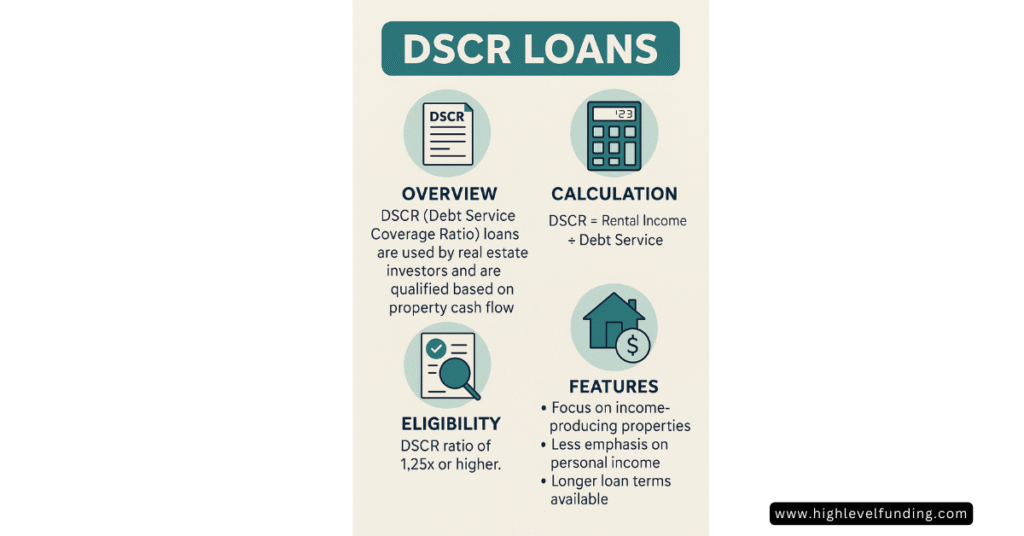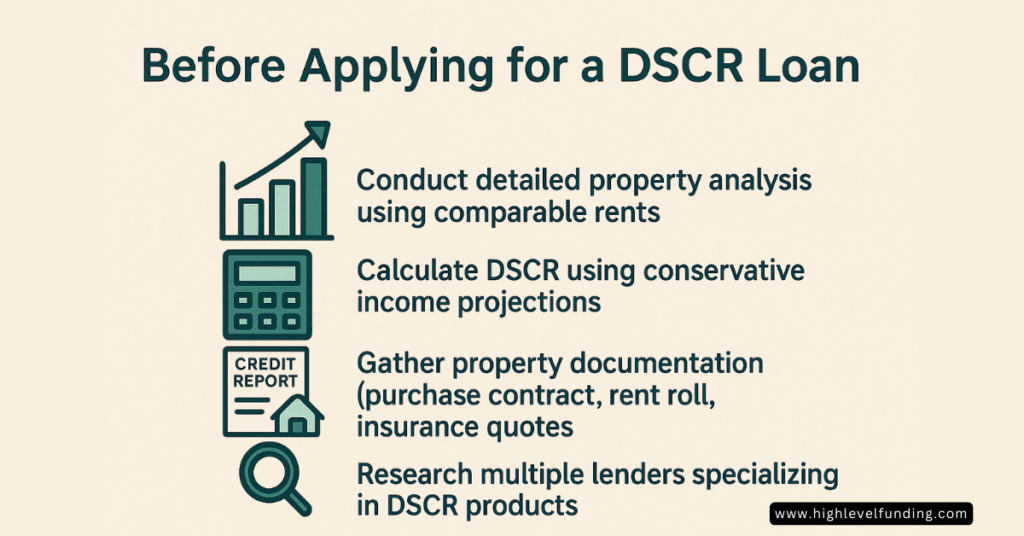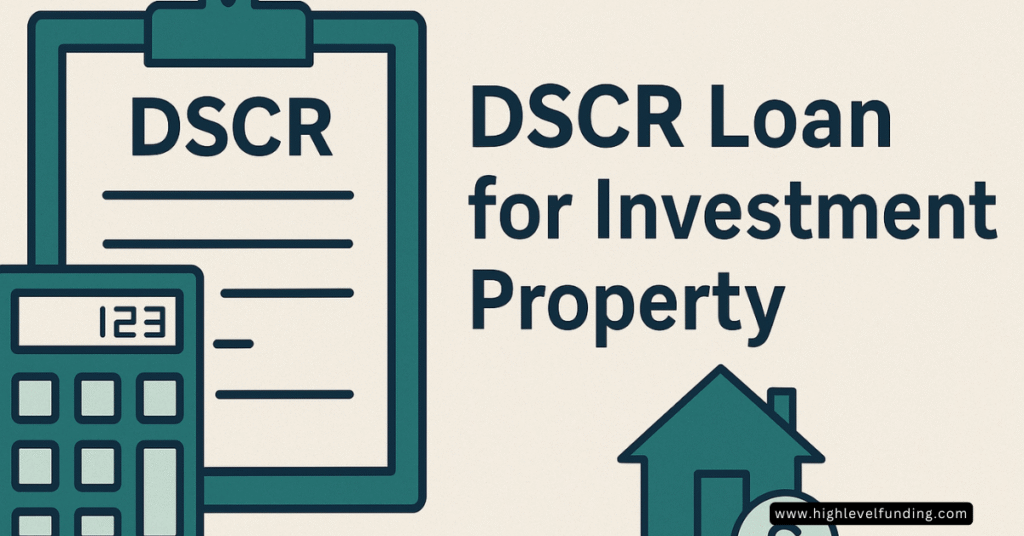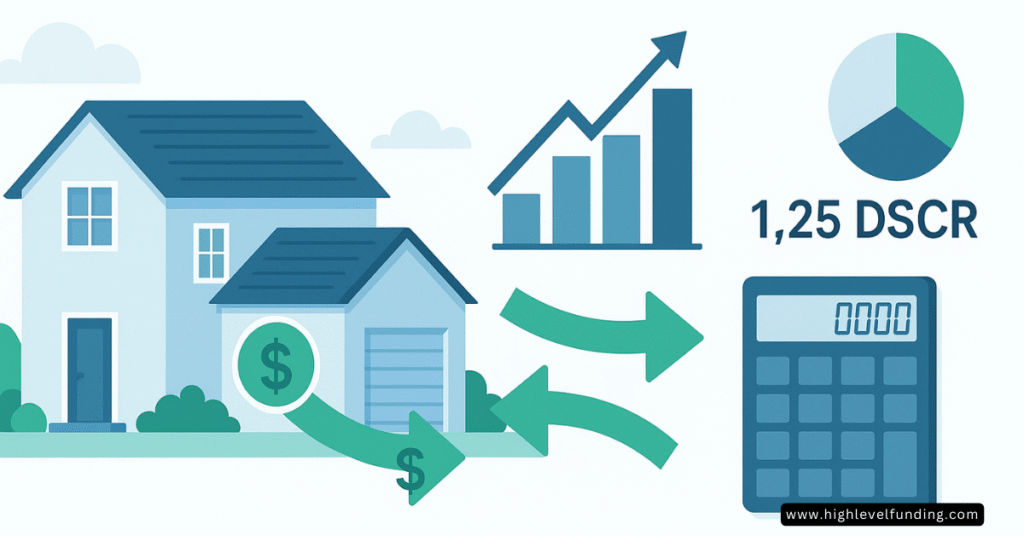A DSCR loan for investment property is a game-changing financing solution that’s revolutionizing how real estate investors acquire and refinance rental properties. Unlike traditional mortgages that scrutinize every detail of your personal income, DSCR rental loans evaluate your property’s ability to generate rental income and cover its own debt payments.
In this comprehensive guide, you’ll discover everything you need to know about using a DSCR loan for your investment property portfolio. Whether you’re a seasoned investor hitting conventional loan limits or a self-employed professional struggling with traditional mortgage qualification, this financing option could unlock your next level of real estate success.
Key Takeaways
- DSCR loans focus on property cash flow, not personal income verification
- Faster closing process with less documentation than conventional loans
- Higher interest rates and down payments are typical trade-offs
- Ideal for investors with strong rental properties and complex income situations
- DSCR of 1.25 or higher typically secures the best terms
- Beyond the Hype: Understanding the True Power of DSCR Loans for Rental Properties
- DSCR Loans Unmasked: Core Concepts & Critical Distinctions
- Are You the Ideal Candidate? Pinpointing Investor Profiles for DSCR Loan Success
- The Upsides & Downsides: A Balanced View of DSCR Loans
- Qualifying for a DSCR Loan: Beyond the Minimums
- The DSCR Loan Application & Approval Journey: Your Step-by-Step Roadmap
- Financial Deep Dive: Maximizing Profitability with DSCR Loans
- Advanced DSCR Loan Strategies & Use Cases
- Navigating Risks and Challenges Specific to DSCR Loans
- Choosing Your DSCR Lending Partner: Beyond Interest Rates
- The Future of DSCR Loans: Market Trends & Investor Outlook
- Strategically Employing DSCR Loans for Your Investment Success
- Bonus Section: Common DSCR Loan Mistakes (And How to Avoid Them)
- Frequently Asked Questions: Expert Answers to Your DSCR Loan Questions
Beyond the Hype: Understanding the True Power of DSCR Loans for Rental Properties
The Investor’s Dilemma: Why Conventional Financing Falls Short
Picture this: You’ve found the perfect rental property with strong cash flow potential, but your conventional lender rejects your application because your debt-to-income ratio is too high. Or maybe you’re self-employed and can’t provide the traditional income documentation banks demand. Sound familiar?
Traditional mortgage hurdles include:
- Strict debt-to-income ratio requirements
- Extensive personal income verification
- Limits on the number of financed properties (typically 4-10)
- Lengthy approval processes with mountains of paperwork
These challenges have left countless real estate investors sidelined, watching opportunities slip away while dealing with bureaucratic lending requirements.
Introducing the DSCR Loan: Your Portfolio Game-Changer
A DSCR loan for investment property flips the script entirely. Instead of analyzing your personal finances, lenders evaluate whether your rental property generates enough income to cover its own loan payments. This revolutionary approach opens doors for investors who’ve been locked out of traditional financing.
The core principle is simple: If your investment property with a DSCR loan can demonstrate sufficient rental income to service its debt, you qualify – regardless of your personal income complexity.
Who Absolutely Needs to Read This Guide
You’ll benefit most from DSCR rental loans if you’re:
- Self-employed professionals with fluctuating or hard-to-document income
- Portfolio builders approaching conventional loan limits
- Investors seeking faster closing for competitive market advantages
- LLC or corporation owners wanting to finance through business entities
- Foreign nationals investing in U.S. real estate markets
DSCR Loans Unmasked: Core Concepts & Critical Distinctions
What Exactly is a DSCR Loan?
DSCR stands for Debt Service Coverage Ratio – a simple calculation that determines if your rental property generates enough income to cover its mortgage payments. Think of it as your property’s financial report card.
The debt service coverage ratio formula is straightforward:
DSCR = Net Operating Income (NOI) ÷ Total Debt Service
When lenders evaluate your DSCR loan application, they’re essentially asking: “Can this property pay for itself?”
Here’s how lenders interpret DSCR numbers:
- DSCR below 1.0: Property income can’t fully cover loan payments
- DSCR of 1.0: Property income exactly matches loan payments (break-even)
- DSCR above 1.0: Property generates excess income beyond loan payments
- DSCR of 1.25 or higher: Ideal ratio that typically secures the best terms
How DSCR is Calculated: The Mathematical Foundation
Understanding how to calculate your DSCR is crucial for investment success. Let’s break down each component:
Net Operating Income (NOI) includes:
- Monthly rental income from all units
- Additional income (parking, laundry, storage fees)
- Minus operating expenses (taxes, insurance, maintenance, property management)
Total Debt Service includes:
- Principal and interest payments
- Property taxes
- Homeowners insurance
- HOA or association dues (if applicable)
Real-world example: If your rental property generates $3,000 monthly NOI and your total debt service is $2,400, your DSCR would be 1.25 ($3,000 ÷ $2,400). This indicates healthy cash flow with a 25% cushion above break-even.
| Related: Use our DSCR Loan Calculator to Check If You Are Eligible
DSCR Loans vs. Conventional Mortgages: A Side-by-Side Comparison
| Feature | DSCR Loan | Conventional Mortgage |
|---|---|---|
| Income Verification | Property rental income | Personal income documentation |
| Documentation | Minimal personal financials | Extensive personal documentation |
| Property Limits | Typically unlimited | Usually 4-10 properties |
| Closing Speed | 21-30 days | 30-45 days |
| Down Payment | 20-25% minimum | 15-25% for investment properties |
| Interest Rates | Typically 0.5-1% higher | Market rates |
| Property Types | Investment properties only | Primary, secondary, investment |
Essential DSCR Loan Terminology
LTV (Loan-to-Value): Percentage of property value being financed
NOI (Net Operating Income): Property’s annual income minus operating expenses
Non-QM: Non-Qualified Mortgage products with flexible underwriting
PITIA: Principal, Interest, Taxes, Insurance, Association dues

Are You the Ideal Candidate? Pinpointing Investor Profiles for DSCR Loan Success
The Seasoned Portfolio Builder
If you’re a real estate investor looking to expand beyond conventional loan limits, DSCR loans offer unlimited scalability. Many investors hit the 4-10 property wall with traditional financing, but DSCR loans are designed to support unlimited portfolio growth based on each property’s individual performance.
The Self-Employed Professional
Investors looking for alternatives to traditional income verification find DSCR loans liberating. Whether you’re a contractor, consultant, or business owner with complex financials, your property’s rental income becomes your qualification credential.
The Cash Flow Focused Investor
DSCR loans are ideal for investors who prioritize properties that generate strong rental income. If you’ve mastered the art of identifying cash-flowing properties, this loan type rewards your expertise by focusing on what matters most – the property’s income potential.
Fast-Moving Market Participants
In competitive markets where investors looking for speed advantages, the streamlined DSCR loan process can make the difference between winning and losing a deal. Reduced documentation requirements typically translate to faster closings.
When DSCR Loans Might Not Fit
Consider a DSCR loan carefully if you’re:
- Purchasing a primary residence (not allowed)
- Buying properties requiring significant renovation
- Operating with minimal cash reserves
- Seeking the absolute lowest interest rates available
The Upsides & Downsides: A Balanced View of DSCR Loans
Compelling Advantages of DSCR Loans
No Personal Income Verification Required
The biggest advantage? DSCR loan allows real estate investors to qualify based solely on property performance. Your tax returns, pay stubs, and employment verification become irrelevant.
Unlimited Property Financing
Unlike conventional loans with strict property limits, loan allows investors to leverage unlimited properties, each evaluated on its own merits.
Faster Closing Process
Reduced documentation typically means DSCR loans can close in 21-30 days versus 30-45 days for conventional mortgages.
Business Entity Financing
DSCR loan allows financing through LLCs or corporations, providing liability protection and tax advantages.
Potential Drawbacks and Strategic Mitigation
Higher Interest Rates
DSCR loans typically carry rates 0.5-1% above conventional mortgages. Mitigation strategy: Shop multiple lenders and improve your property’s DSCR through higher down payments or income optimization.
Larger Down Payment Requirements
Most DSCR loan requirements include 20-25% down payments. Mitigation strategy: Partner with other investors or focus on properties with exceptional cash flow that justify the higher equity requirements.
Prepayment Penalties
Many DSCR loan products include prepayment penalties. Mitigation strategy: Understand terms clearly and align with your investment timeline.
Property Condition Standards
Loans typically require properties to be rent-ready. Mitigation strategy: Budget for necessary improvements before closing.
Qualifying for a DSCR Loan: Beyond the Minimums
The “Magic” DSCR Number
While minimum DSCR requirements vary by lender (typically 1.0-1.2), a good DSCR ratio of 1.25 or higher unlocks the best terms and rates. This 25% cushion demonstrates strong cash flow reliability to lenders.
Credit Score Requirements
DSCR loan requirements typically include:
- Minimum 620-660 credit score for most programs
- 680+ scores for optimal rates and terms
- 700+ scores for premium programs with maximum flexibility
Down Payment and Equity Standards
Standard LTV requirements:
- 75-80% maximum LTV for most properties
- 20-25% down payment minimum
- Higher down payments often improve rates and terms
Cash Reserve Requirements
Lenders for DSCR loans typically require 3-6 months of PITIA payments in reserves, demonstrating your ability to handle temporary vacancy or unexpected expenses.
Property Appraisal and Rent Schedule
The appraisal process focuses heavily on market value and rental income potential. Appraisers will:
- Analyze comparable rental properties
- Verify current rental rates in the area
- Assess the property’s income-generating potential
- Confirm the property meets rental standards
The DSCR Loan Application & Approval Journey: Your Step-by-Step Roadmap
Pre-Application Preparation
Before applying for a DSCR loan:
- Conduct detailed property analysis using comparable rents
- Calculate DSCR using conservative income projections
- Review and optimize your credit report
- Gather property documentation (purchase contract, rent roll, insurance quotes)
- Research multiple lenders specializing in DSCR products

Finding the Right DSCR Lender
Types of DSCR loan providers:
- Portfolio lenders (banks keeping loans in-house)
- Non-QM specialists
- Online lending platforms
- Mortgage brokers with DSCR expertise
The Application Process Deep Dive
Required documentation typically includes:
- Property purchase contract or refinance application
- Current rent roll or lease agreements
- Property insurance quotes
- Recent tax returns (fewer than conventional loans)
- Bank statements (2-3 months)
- Corporate documents (if financing through entity)
The underwriting process focuses on:
- Property appraisal and rent verification
- Borrower credit and liquidity
- Property condition and marketability
- Local rental market analysis
Navigating Common Roadblocks
Low appraisal scenarios: Be prepared with comparable sales and rental data to support your property’s value.
Rental income disputes: Provide market rent studies and comparable property analysis to justify income projections.
Property condition issues: Budget for necessary improvements and obtain contractor estimates if repairs are required.
Financial Deep Dive: Maximizing Profitability with DSCR Loans
Strategies to Improve Your Property’s DSCR
Increasing rental income:
- Strategic renovations that justify higher rents
- Adding income streams (parking, storage, laundry)
- Market rent adjustments based on current comparables
- Professional property management optimization
Reducing operating expenses:
- Shopping insurance annually for better rates
- Implementing energy-efficient improvements
- Negotiating property management fees
- Optimizing maintenance through preventive care
Financial structure optimization:
- Larger down payments to reduce loan amounts
- Interest-only loan options (where available)
- Negotiating purchase price reductions
Analyzing the True Cost of DSCR Loans
Beyond interest rates, consider:
- Origination fees (typically 1-2% of loan amount)
- Processing and underwriting fees
- Appraisal and inspection costs
- Prepayment penalty structures
- Title insurance and closing costs
Total cost analysis example:
A $400,000 DSCR loan at 7.5% with 1.5% origination fee costs approximately $6,000 upfront plus the ongoing interest differential compared to conventional financing.
Cash Flow Analysis Post-Financing
Monthly cash flow calculation:
Gross rental income
- Operating expenses (taxes, insurance, maintenance)
- Property management fees
- Loan payments (PITIA)
= Net monthly cash flow
Target metrics for success:
- Positive cash flow from day one
- 5-10% cash-on-cash return minimum
- DSCR of 1.25+ for optimal financial health
| Related: Pros and Cons of DSCR Loans: Smart Investment Financing?
Advanced DSCR Loan Strategies & Use Cases
Refinancing Existing Investment Properties
Cash-out refinancing scenarios:
DSCR loans can help extract equity from performing properties to fund new acquisitions. If your property has appreciated and rents have increased, refinancing with a DSCR loan allows you to access capital while maintaining positive cash flow.
Rate-and-term refinancing:
Switch from conventional mortgages to DSCR loans to eliminate personal income verification requirements for future portfolio growth.
Scaling Your Portfolio Strategically
DSCR loans are perfect for real estate investors implementing systematic portfolio expansion. Each property is evaluated independently, allowing unlimited growth based on individual property performance rather than cumulative debt-to-income ratios.
Short-Term Rental Applications
DSCR loans for rental properties include Airbnb and VRBO investments. However, lenders for DSCR loans specializing in short-term rentals may require:
- AirDNA or similar market analysis reports
- Higher DSCR requirements (1.3-1.5+)
- Larger cash reserves (6-12 months)
- Property management agreements
The BRRRR Method Integration
Buy, Rehab, Rent, Refinance, Repeat strategies work well with DSCR loans during the refinancing phase. After completing improvements and establishing rental history, the loan allows investors to leverage increased property value and proven income for portfolio expansion.
Navigating Risks and Challenges Specific to DSCR Loans
Market Risk Management
Rental market fluctuations can impact your ability to maintain adequate DSCR ratios. Mitigate this risk by:
- Choosing properties in diversified, stable markets
- Maintaining conservative rental income projections
- Building cash reserves for market downturns
Vacancy Risk Protection
Extended vacancies directly impact your property’s ability to cover the loan payments. Protection strategies include:
- Screening tenants thoroughly
- Maintaining 3-6 months cash reserves
- Considering rent loss insurance
- Diversifying across multiple properties
Interest Rate Risk Considerations
Variable rate DSCR loans expose you to payment increases. If you’re considering a DSCR loan with adjustable rates, ensure your DSCR provides adequate cushion for potential rate increases.
Overleveraging Prevention
Relying solely on property income without personal financial backup can be dangerous. Maintain:
- Adequate personal liquidity
- Conservative debt service coverage ratios
- Diversified income sources beyond real estate
Choosing Your DSCR Lending Partner: Beyond Interest Rates
Types of DSCR Loan Providers
Portfolio lenders keep loans on their books, offering more flexibility but potentially higher rates.
Non-QM specialists focus exclusively on alternative lending products with streamlined processes.
Online platforms provide technology-driven applications with competitive rates.
Mortgage brokers offer access to multiple lenders but add another layer of fees.
Key Evaluation Criteria
When selecting a lender for DSCR loans, prioritize:
Experience and expertise: Choose lenders specializing in investment property financing with proven DSCR loan track records.
Rate and fee transparency: Compare not just interest rates but all associated costs including origination fees, processing charges, and prepayment penalties.
LTV and DSCR flexibility: Some lenders offer DSCR loans with more flexible ratios or higher LTVs for strong borrowers.
Property type acceptance: Ensure your lender finances your specific property type (single-family, multi-family, short-term rentals).
Closing efficiency: Speed matters in competitive markets. Verify the lender’s typical timeline and their ability to meet deadlines.
Critical Questions for Potential Lenders
- What are your minimum DSCR and credit score requirements?
- What LTV do you offer, and do better ratios improve terms?
- What property types do you finance?
- What are your typical closing timeframes?
- Do you have prepayment penalties, and what are the terms?
- What cash reserve requirements do you have?
- Do you finance through business entities?
- What documentation do you require for the application?
Red Flags to Avoid
Avoid lenders who:
- Promise unrealistic terms or guarantees
- Lack investment property lending experience
- Have poor online reviews or BBB ratings
- Require large upfront fees before application approval
- Can’t provide clear rate and fee structures
- Have inconsistent communication or missed deadlines
The Future of DSCR Loans: Market Trends & Investor Outlook
Current Market Dynamics
Rising interest rates have made DSCR loans more expensive, but they remain attractive for investors who can’t qualify for conventional financing. The growing popularity among real estate investors continues as more discover the benefits of income-based qualification.
Evolution of DSCR Products
Lenders are innovating with:
- Lower minimum DSCR requirements for strong borrowers
- Expanded property type acceptance
- Improved technology for faster processing
- More competitive rate structures
Market Demand Predictions
As conventional lending becomes more restrictive and real estate investors seek portfolio scalability, demand for DSCR loan products is expected to grow significantly. This increased demand will likely drive more lenders into the market, improving competition and terms for borrowers.
Strategically Employing DSCR Loans for Your Investment Success
Final Strategic Considerations
DSCR loans are a great option for real estate investors who understand their place in a comprehensive financing strategy. They’re not always the cheapest option, but they offer unmatched flexibility for portfolio growth and property-focused underwriting.
Before pursuing a DSCR loan, ensure you have:
- Strong rental property cash flow projections
- Adequate cash reserves for down payment and reserves
- Clear understanding of all costs and terms
- Appropriate property that meets lender criteria
- Long-term investment strategy that justifies the higher costs
Your DSCR Loan Success Checklist
✅ Property Analysis Complete: Verified rental income projections and DSCR calculations
✅ Credit Optimized: Score of 660+ with any issues addressed
✅ Down Payment Ready: 20-25% plus closing costs and reserves
✅ Lender Research Done: Multiple quotes from qualified DSCR specialists
✅ Documentation Prepared: All required property and financial documents ready
✅ Market Analysis Verified: Rental comparables and property value confirmed
✅ Investment Strategy Aligned: DSCR loan fits your long-term portfolio goals
Building Generational Wealth Through Strategic Financing
DSCR loans can be used as powerful tools for building generational wealth through real estate. By focusing on property performance rather than personal income limitations, they enable investors to scale portfolios that generate passive income and long-term appreciation.
The key to success lies in choosing properties with strong fundamentals, maintaining conservative financial projections, and working with experienced lenders who understand investment property financing.
Your journey to real estate investment success doesn’t have to be limited by traditional financing constraints. With the right DSCR loan strategy, you can unlock the full potential of income-producing real estate investments.
Bonus Section: Common DSCR Loan Mistakes (And How to Avoid Them)
Critical Errors That Cost Investors
Mistake #1: Overestimating rental income
Use conservative market rents, not optimistic projections. Research comparable properties thoroughly and consider seasonal variations.
Mistake #2: Underestimating operating expenses
Include all costs: taxes, insurance, maintenance, property management, and vacancy allowances. Budget 25-35% of gross income for expenses.
Mistake #3: Ignoring prepayment penalties
Understand the penalty structure before signing. Some loans have substantial penalties that can eliminate refinancing opportunities.
Mistake #4: Choosing lenders based solely on rate
Consider the total package: rates, fees, service quality, and closing reliability matter more than the lowest advertised rate.
Mistake #5: Insufficient cash reserves
Maintain adequate reserves beyond lender requirements. Real estate investing requires financial cushions for unexpected situations.
Frequently Asked Questions: Expert Answers to Your DSCR Loan Questions
Can I use a DSCR loan for my primary residence?
No, DSCR loans can only be used for investment properties that generate rental income. They’re not available for primary residences or second homes.
What happens if my property becomes vacant?
You’re still responsible for loan payments regardless of vacancy. This is why maintaining adequate cash reserves and choosing properties in strong rental markets is crucial.
Can I refinance a DSCR loan later?
Yes, but check for prepayment penalties. Many DSCR loan products include penalties that may make early refinancing expensive.
Do I need real estate investment experience to qualify?
While some lenders prefer experienced investors, many DSCR loans are designed for investors at all experience levels. Strong property fundamentals matter more than experience.
Can I finance multiple properties simultaneously?
Yes, each property is evaluated independently. However, lenders may require seasoning periods between purchases or limit the number of simultaneous transactions.
Ready to explore DSCR loan options for your investment property? Connect with a qualified lender today to discuss your specific situation and discover how property-focused financing can accelerate your real estate investment success.



